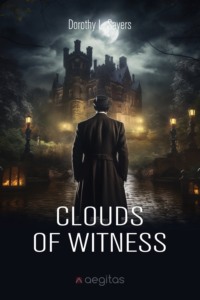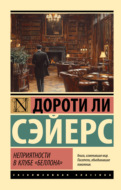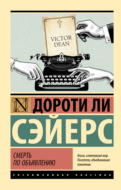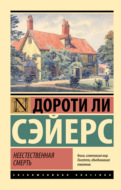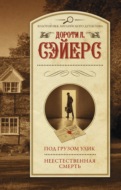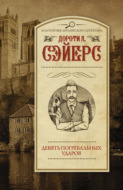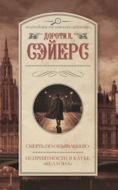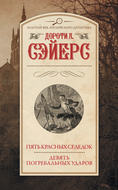Kitab fayl olaraq yüklənə bilməz, yalnız mobil tətbiq və ya onlayn olaraq veb saytımızda oxuna bilər.
Kitabı oxu: «Clouds of Witness»
Reader Reactions
From Susan
This delightful mystery is the second featuring Lord Peter Wimsey. When his brother, the Duke of Denver, is accused of murder then it is Lord Peter's job to clear his name. The Duke is found standing over the body of his sister's fiancé, who he has recently argued with about claims that the victim, Captain Denis Cathcart, was a card sharp. However, when questioned, he refuses to give a reasonable account of why he was wandering around outside, in the middle of the night. Why is he being so secretive and what is their sister, Mary, hiding?
This is a wonderful, Golden Age mystery, with Lord Peter Wimsey and Charles Parker truly collaborating. There are some great, atmospheric scenes, most notably when Wimsey and Bunter are lost on the moors. The scenes in the House of Lords, where the Duke of Denver is tried, are also very interesting. Much of the fun in these books is in Wimsey himself and his light-hearted banter and eccentric behaviour. He is one of the greatest fictional amateur detectives and this is one of his best cases.
From Kaethe
The plot is absurdly complicated, amusingly so. There are no end of intrigues in the country house where the murder takes place.
But that's not the joy of reading a Sayers' novel: the pleasure is all in the humor. Wimsey acting a fool, Bunter's magical ability to produce anything needed, Mary's good heart, and the Dowager's formidable control of everything. It's Downton Abbey written by Oscar Wilde.
From Susan
This is the second book in the Peter Wimsey series and is simply delightful. His brother, the Duke of Denver, is arrested at a family's "shooting box", Riddlesdale Lodge. The murdered man is the fiancée of his sister, Mary.
This novel really gives you a look at Peter and his family. There is not enough of the Dowager Duchess but it's fun getting to know his siblings. Bunter is someone I want in my life. He runs Peter's bath water, brings him breakfast in bed and pulls him out of quicksand. Peter's life? Who wouldn't want it? He's waited on hand and food, has no money worries and spends his time looking for rare books. It sounds like heaven to me.
This is a buddy read with my GR Ireland group and I am loving reading this series. I don't know how I missed Sayers' books before this but I'm glad I've found her now.
From Elinor
Surely Dorothy Sayers must be the grand master of dialogue and dialect, both highbrow and lowbrow. Her working class characters are delightful, and the upper crust characters litter their conversation with literary references which I either have to stop and look up – or just read and enjoy. Each chapter begins with a quote from literature, ranging from Shakespeare to fairy tales.
I particularly love Lord Peter Wimsey's speeches. For example, here he is speaking to his butler: "Bunter," said his lordship, "I'm the biggest ass in Christendom. When a thing is close under my nose I can't see it. I get a telescope, and look for the explanation in Stapley. I deserve to be crucified upside-down, as a cure for anemia of the brain." There is much more in this vein, all of it highly entertaining.
Moreover, her murder mysteries are well-plotted and interesting. All in all, a very satisfying read.
From Damaskcat
This is the second novel featuring Lord Peter Wimsey. This time murder comes unpleasantly close to home when Lord Peter's brother – the Duke of Denver – is accused of the murder of his sister's fiancé. Riddlesdale Lodge is the scene for the death of Captain Cathcart and no one seems to be telling the truth about what they were doing at the time of the man's death. Lord Peter begins to think that his brother will go to the gallows rather than reveal what he was doing at the time.
The investigation will lead Wimsey into personal danger before he finally ferrets out the truth of what really happened on the fateful night which looks like destroying his family. I enjoyed this book and thought the plot was very well done. I didn't work out what really happened until all was revealed by the combined efforts of Wimsey and Chief Inspector Charles Parker of Scotland Yard, an old friend of Wimsey's.
I like the way the family interact – Gerald, the Duke, not very bright but trying to do what is expected from him in his role in society; Lady Mary – hiding something from a mistaken idea that to reveal it will put everyone in danger; the Dowager Duchess – shrewd and observant in spite of her flighty persona and Helen – wife to Gerald and bent on keeping up appearances in all the wrong ways.
I can recommend this book to anyone who enjoyed Golden Age crime stories and even though it is part of a series it can be read a standalone novel.
Clouds of Witness: A Lord Peter Wimsey Mystery
The Solution of the Riddlesdale Mystery with a Report of the Trial of the Duke of Denver before the House of Lords for Murder
The inimitable stories of Long-King never have any real ending, and this one, being in his most elevated style, has even less end than most of them. But the whole narrative is permeated with the odour of joss-sticks and honourable high-mindedness, and the two characters are both of noble birth.
– The Wallet of Kai-Lung
Chapter I
"Of His Malice Aforethought"
"O, Who hath done this deed?"
– Othello
LORD PETER WIMSEY stretched himself luxuriously between the sheets provided by the Hotel Meurice.
After his exertions in the unravelling of the Battersea Mystery, he had followed Sir Julian Freke's advice and taken a holiday. He had felt suddenly weary of breakfasting every morning before his view over the Green Park; he had realised that the picking up of first editions at sales afforded insufficient exercise for a man of thirty-three; the very crimes of London were over-sophisticated. He had abandoned his flat and his friends and fled to the wilds of Corsica. For the last three months he had forsworn letters, newspapers, and telegrams. He had tramped about the mountains, admiring from a cautious distance the wild beauty of Corsican peasant-women, and studying the vendetta in its natural haunt. In such conditions murder seemed not only reasonable, but lovable. Bunter, his confidential man and assistant sleuth, had nobly sacrificed his civilised habits, had let his master go dirty and even unshaven, and had turned his faithful camera from the recording of finger-prints to that of craggy scenery. It had been very refreshing.
Now, however, the call of the blood was upon Lord Peter. They had returned late last night in a vile train to Paris, and had picked up their luggage. The autumn light, filtering through the curtains, touched caressingly the silver-topped bottles on the dressing-table, outlined an electric lamp-shade and the shape of the telephone.
A noise of running water near by proclaimed that Bunter had turned on the bath (h. & c.) and was laying out scented soap, bath-salts, the huge bath-sponge, for which there had been no scope in Corsica, and the delightful flesh-brush with the long handle, which rasped you so agreeably all down the spine. "Contrast," philosophised Lord Peter sleepily, "is life. Corsica-Paris-then London… Good morning, Bunter."
"Good morning, my lord. Fine morning, my lord. Your lordship's bath-water is ready."
"Thanks," said Lord Peter. He blinked at the sunlight.
It was a glorious bath. He wondered, as he soaked in it, how he could have existed in Corsica. He wallowed happily and sang a few bars of a song. In a soporific interval he heard the valet de chambre bringing in coffee and rolls. Coffee and rolls! He heaved himself out with a splash, towelled himself luxuriously, enveloped his long-mortified body in a silken bathrobe, and wandered back.
To his immense surprise he perceived Mr. Bunter calmly replacing all the fittings in his dressing-case.
Another astonished glance showed him the bags-scarcely opened the previous night-repacked, relabelled, and standing ready for a journey.
"I say, Bunter, what's up?" said his lordship. "We're stayin' here a fortnight y'know."
"Excuse me, my lord," said Mr. Bunter, deferentially, "but, having seen The Times (delivered here every morning by air, my lord; and very expeditious I'm sure, all things considered), I made no doubt your lordship would be wishing to go to Riddlesdale at-"
"Riddlesdale!" exclaimed Peter. "What's the matter? Anything wrong with my brother?"
For answer Mr. Bunter handed him the paper, folded open at the heading:
RIDDLESDALE INQUEST.
DUKE OF DENVER ARRESTED
ON MURDER CHARGE.
Lord Peter stared as if hypnotised.
"I thought your lordship wouldn't wish to miss anything," said Mr. Bunter, "so I took the liberty-"
Lord Peter pulled himself together.
"When's the next train?" he asked.
"I beg your lordship's pardon-I thought your lordship would wish to take the quickest route. I took it on myself to book two seats in the aeroplane Victoria. She starts at 11.30."
Lord Peter looked at his watch.
"Ten o'clock," he said. "Very well. You did quite right. Dear me! Poor old Gerald arrested for murder. Uncommonly worryin' for him, poor chap. Always hated my bein' mixed up with police-courts. Now he's there himself. Lord Peter Wimsey in the witness-box-very distressin' to feelin's of a brother. Duke of Denver-the dock-worse still. Dear me! Well, I suppose one must have breakfast."
"Yes, my lord. Full account of the inquest in the paper, my lord."
"Yes. Who's on the case, by the way?"
"Mr Parker, my lord."
"Parker? That's good. Splendid old Parker! Wonder how he managed to get put on to it. How do things look, Bunter?"
"If I may say so, my lord, I fancy the investigation will prove very interesting. There are several extremely suggestive points in the evidence, my lord."
"From a criminological point of view I daresay it is interesting," replied his lordship, sitting down cheerfully to his café au lait, "but it's deuced awkward for my brother, all the same, havin' no turn for criminology, what?"
"Ah, well-" said Mr. Bunter, "they say, my lord, there's nothing like having a personal interest."
"The inquest was held to-day at Riddlesdale, in the North Riding of Yorkshire, on the body of Captain Denis Cathcart, which was found at three o'clock on Thursday morning lying just outside the conservatory door of the Duke of Denver's shooting-box, Riddlesdale Lodge. Evidence was given to show that deceased had quarrelled with the Duke of Denver on the preceding evening, and was subsequently shot in a small thicket adjoining the house. A pistol belonging to the Duke was found near the scene of the crime. A verdict of murder was returned against the Duke of Denver. Lady Mary Wimsey, sister of the Duke, who was engaged to be married to the deceased, collapsed after giving evidence, and is now lying seriously ill at the Lodge. The Duchess of Denver hastened from town yesterday and was present at the inquest. Full report on p. 12."
"Poor old Gerald!" thought Lord Peter, as he turned to Page 12; "and poor old Mary! I wonder if she really was fond of the fellow. Mother always said not, but Mary never would let on about herself."
The full report began by describing the little village of Riddlesdale, where the Duke of Denver had recently taken a small shooting-box for the season. When the tragedy occurred the Duke had been staying there with a party of guests. In the Duchess's absence Lady Mary Wimsey had acted as hostess. The other guests were Colonel and Mrs. Marchbanks, the Hon. Frederick Arbuthnot, Mr. and Mrs. Pettigrew-Robinson, and the dead man, Denis Cathcart.
The first witness was the Duke of Denver, who claimed to have discovered the body. He gave evidence that he was coming into the house by the conservatory door at three o'clock in the morning of Thursday, October 14th, when his foot struck against something.
He had switched on his electric torch and seen the body of Denis Cathcart at his feet. He had at once turned it over, and seen that Cathcart had been shot in the chest.
He was quite dead. As Denver was bending over the body, he heard a cry in the conservatory, and, looking up, saw Lady Mary Wimsey gazing out horror-struck.
She came out by the conservatory door, and exclaimed at once, "O God, Gerald, you've killed him!" (Sensation.)
The Coroner: "Were you surprised by that remark?"
Duke of D.: "Well, I was so shocked and surprised at the whole thing. I think I said to her, 'Don't look,' and she said, 'Oh, it's Denis! Whatever can have happened? Has there been an accident?' I stayed with the body, and sent her up to rouse the house."
The Coroner: "Did you expect to see Lady Mary Wimsey in the conservatory?"
Duke of D.: "Really, as I say, I was so astonished all round, don't you know, I didn't think about it."
The Coroner: "Do you remember how she was dressed?"
Duke of D.: "I don't think she was in her pyjamas."
(Laughter.) "I think she had a coat on."
The Coroner: "I understand that Lady Mary Wimsey was engaged to be married to the deceased?"
Duke of D.: "Yes."
The Coroner: "He was well known to you?"
Duke of D.: "He was the son of an old friend of my father's; his parents are dead. I believe he lived chiefly abroad. I ran across him during the war, and in 1919 he came to stay at Denver. He became engaged to my sister at the beginning of this year."
The Coroner: "With your consent, and with that of the family?"
Duke of D.: "Oh, yes, certainly."
The Coroner: "What kind of man was Captain Cathcart?"
Duke of D.: "Well-he was a Sahib and all that. I don't know what he did before he joined in 1914. I think he lived on his income; his father was well off. Crack shot, good at games, and so on. I never heard anything against him-till that evening."
The Coroner: "What was that?"
Duke of D.: "Well-the fact is-it was deuced queer, He- If anybody but Tommy Freeborn had said it I should never have believed it." (Sensation.)
The Coroner: "I'm afraid I must ask your grace of what exactly you had to accuse the deceased."
Duke of D.: "Well, I didn't-I don't exactly accuse him. An old friend of mine made a suggestion. Of course I thought it must be all a mistake, so I went to Cathcart, and, to my amazement, he practically admitted it! Then we both got angry, and he told me to go to the devil, and rushed out of the house." (Renewed sensation.)
The Coroner: "When did this quarrel occur?"
Duke of D.: "On Wednesday night. That was the last I saw of him." (Unparalleled sensation.)
The Coroner: "Please, please, we cannot have this disturbance. Now, will your grace kindly give me, as far as you can remember it, the exact history of this quarrel?"
Duke of D.: "Well, it was like this. We'd had a long day on the moors and had dinner early, and about half-past nine we began to feel like turning in. My sister and Mrs. Pettigrew-Robinson toddled on up, and we were havin' a last peg in the billiard-room when Fleming-that's my man-came in with the letters. They come at any old time in the evening, you know, we being two and a half miles from the village. No-I wasn't in the billiard-room at the time-I was lockin' up the [missing]-room. The letter was from an old friend of mine I hadn't seen for years-Tom Freeborn-used to know him at the House-"
The Coroner: "Whose house?"
Duke of D.: "Oh, Christ Church, Oxford. He wrote to say he'd seen the announcement of my sister's engagement in Egypt."
The Coroner: "In Egypt?"
Duke of D.: "I mean, he was in Egypt-Tom Freeborn, you see-that's why he hadn't written before. He engineers. He went out there after the war was over, you see, and, bein' somewhere up near the sources of the Nile, he doesn't get the papers regularly. He said, would I 'scuse him for interferin' in a very delicate matter, and all that, but did I know who Cathcart was? Said he'd met him in Paris during the war, and he lived by cheatin' at cards-said he could swear to it, with details of a row there'd been in some French place or other. Said he knew I'd want to chew his head off-Freeborn's, I mean-for buttin' in, but he'd seen the man's photo in the paper, an' he thought I ought to know."
The Coroner: "Did this letter surprise you?"
Duke of D.: "Couldn't believe it at first. If it hadn't been old Tom Freeborn I'd have put the thing in the fire straight off, and, even as it was, I didn't quite know what to think. I mean, it wasn't as if it had happened in England, you know. I mean to say, Frenchmen get so excited about nothing. Only there was Freeborn, and he isn't the kind of man that makes mistakes."
The Coroner: "What did you do?"
Duke of D.: "Well, the more I looked at it the less I liked it, you know. Still, I couldn't quite leave it like that, so I thought the best way was to go straight to Cathcart. They'd all gone up while I was sittin' thinkin' about it, so I went up and knocked at Cathcart's door. He said, 'What's that?' or 'Who the devil's that?' or somethin' of the sort, and I went in. 'Look here,' I said, 'can I just have a word with you?' 'Well, cut it short, then,' he said. I was surprised-he wasn't usually rude. 'Well,' I said, 'fact is, I've had a letter I don't much like the look of, and I thought the best thing to do was to bring it straight away to you an' have the whole thing cleared up. It's from a man-a very decent sort-old college friend, who says he's met you in Paris.' 'Paris!' he said, in a most uncommonly unpleasant way. 'Paris! What the hell do you want to come talkin' to me about Paris for?' 'Well,' I said, 'don't talk like that, because it's misleadin' under the circumstances.' 'What are you drivin' at?' says Cathcart. 'Spit it out and go to bed, for God's sake.' I said, 'Right oh! I will. It's a man called Freeborn, who says he knew you in Paris and that you made money cheatin' at cards.' I thought he'd break out at that, but all he said was, 'What about it?' 'What about it?' I said. 'Well, of course, it's not the sort of thing I'm goin' to believe like that, right bane-slap off, without any proofs.' Then he said a funny thing. He said, 'Beliefs don't matter-it's what one knows about people.' 'Do you mean to say you don't deny it?' I said. 'It's no good my denying it,' he said; 'you must make up your own mind. Nobody could disprove it.' And then he suddenly jumped up, nearly knocking the table over, and said, 'I don't care what you think or what you do, if you'll only get out. For God's sake leave me alone!' 'Look here,' I said, 'you needn't take it that way. I don't say I do believe it-in fact,' I said, 'I'm sure there must be some mistake; only, you bein' engaged to Mary,' I said, 'I couldn't just let it go at that without looking into it, could I?' 'Oh!' says Cathcart, 'if that's what's worrying you, it needn't. That's off.' I said, 'What?' He said, 'Our engagement.' 'Off?' I said. 'But I was talking to Mary about it only yesterday.' 'I haven't told her yet,' he said. 'Well,' I said, 'I think that's damned cool. Who the hell do you think you are, to come here and jilt my sister?' Well, I said quite a lot, first and last. 'You can get out,' I said; 'I've no use for swine like you.' 'I will,' he said, and he pushed past me an' slammed downstairs and out of the front door, an' banged it after him."
The Coroner: "What did you do?"
Duke of D.: "I ran into my bedroom, which has a window over the conservatory, and shouted out to him not to be a silly fool. It was pourin' with rain and beastly cold. He didn't come back, so I told Fleming to leave the conservatory door open-in case he thought better of it-and went to bed."
The Coroner: "What explanation can you suggest for Cathcart's behaviour?"
Duke of D.: "None. I was simply staggered. But I think he must somehow have got wind of the letter, and knew the game was up."
The Coroner: "Did you mention the matter to anybody else?"
Duke of D.: "No. It wasn't pleasant, and I thought I'd better leave it till the morning."
The Coroner: "So you did nothing further in the matter?"
Duke of D.: "No. I didn't want to go out huntin' for the fellow. I was too angry. Besides, I thought he'd change his mind before long-it was a brute of a night and he'd only a dinner-jacket."
The Coroner: "Then you just went quietly to bed and never saw deceased again?"
Duke of D.: "Not till I fell over him outside the conservatory at three in the morning."
The Coroner: "Ah yes. Now can you tell us how you came to be out of doors at that time?"
Duke of D. (hesitating): "I didn't sleep well. I went out for a stroll."
The Coroner: "At three o'clock in the morning?"
Duke of D.: "Yes." With sudden inspiration; "You see, my wife's away." (Laughter and some remarks from the back of the room.)
The Coroner: "Silence, please… You mean to say that you got up at that hour of an October night to take a walk in the garden in the pouring rain?"
Duke of D.: "Yes, just a stroll." (Laughter.)
The Coroner: "At what time did you leave your bedroom?"
Duke of D.: "Oh-oh, about half-past two, I should say."
The Coroner: "Which way did you go out?"
Duke of D.: "By the conservatory door."
The Coroner: "The body was not there when you went out?"
Duke of D.: "Oh, no!"
The Coroner: "Or you would have seen it?"
Duke of D.: "Lord, yes! I'd have had to walk over it."
The Coroner: "Exactly where did you go?"
Duke of D. (vaguely): "Oh, just round about."
The Coroner: "You heard no shot?"
Duke of D.: "No."
The Coroner: "Did you go far away from the conservatory door and the shrubbery?"
Duke of D.: "Well-I was some way away. Perhaps that's why I didn't hear anything. It must have been."
The Coroner: "Were you as much as a quarter of a mile away?"
Duke of D.: "I should think I was-oh, yes, quite!"
The Coroner: "More than a quarter of a mile away?"
Duke of D.: "Possibly. I walked about briskly because it was cold."
The Coroner: "In which direction?"
Duke of D. (with visible hesitation): "Round at the back of the house. Towards the bowling-green."
The Coroner: "The bowling-green?"
Duke of D. (more confidently): "Yes."
The Coroner: "But if you were more than a quarter of a mile away, you must have left the grounds?"
Duke of D.: "I-oh, yes-I think I did. Yes, I walked about on the moor a bit, you know."
The Coroner: "Can you show us the letter you had from Mr. Freeborn?"
Duke of D.: "Oh, certainly-if I can find it. I thought I put it in my pocket, but I couldn't find it for that Scotland Yard fellow."
The Coroner: "Can you have accidentally destroyed it?"
Duke of D.: "No-I'm sure I remember putting it- Oh"-here the witness paused in very patent confusion, and grew red-"I remember now. I destroyed it."
The Coroner: "That is unfortunate. How was that?"
Duke of D.: "I had forgotten; it has come back to me now. I'm afraid it has gone for good."
The Coroner: "Perhaps you kept the envelope?"
Witness shook his head.
The Coroner: "Then you can show the jury no proof of having received it?"
Duke of D.: "Not unless Fleming remembers it."
The Coroner: "Ah, yes! No doubt we can check it that way. Thank you, your grace. Call Lady Mary Wimsey."
The noble lady, who was, until the tragic morning of October 14th, the fiancée of the deceased, aroused a murmur of sympathy on her appearance. Fair and slender, her naturally rose-pink cheeks ashy pale, she seemed overwhelmed with grief. She was dressed entirely in black, and gave her evidence in a very low tone which was at times almost inaudible.
After expressing his sympathy, the Coroner asked, "How long had you been engaged to the deceased?"
Witness: "About eight months."
The Coroner: "Where did you first meet him?"
Witness: "At my sister-in-law's house in London.''
The Coroner: "When was that?"
Witness: "I think it was June last year."
1 From the newspaper report-not Mr. Parker.
The Coroner: "You were quite happy in your engagement?"
Witness: "Quite."
The Coroner: "You naturally saw a good deal of Captain Cathcart. Did he tell you much about his previous life?"
Witness: "Not very much. We were not given to mutual confidences. We usually discussed subjects of common interest."
The Coroner: "You had many such subjects?"
Witness: "Oh, yes."
The Coroner: "You never gathered at any time that Captain Cathcart had anything on his mind?"
Witness: "Not particularly. He had seemed a little anxious the last few days."
The Coroner: "Did he speak of his life in Paris?"
Witness: "He spoke of theatres and amusements there. He knew Paris very well. I was staying in Paris with some friends last February, when he was there, and he took us about. That was shortly after our engagement."
The Coroner: "Did he ever speak of playing cards in Paris?"
Witness: "I don't remember."
The Coroner: "With regard to your marriage-had any money settlements been gone into?"
Witness: "I don't think so. The date of the marriage was not in any way fixed."
The Coroner: "He always appeared to have plenty of money?"
Witness: "I suppose so; I didn't think about it."
The Coroner: "You never heard him complain of being hard up?"
Witness: "Everybody complains of that, don't they?"
The Coroner: "Was he a man of cheerful disposition?"
Witness: "He was very moody, never the same two days together."
The Coroner: "You have heard what your brother said. Did you hear someone run downstairs and bang the front door.
[Some garbled text removed here]
The next witness called was James Fleming, the manservant.
He remembered having brought the letters from Riddlesdale at 9.45 on Wednesday evening. He had taken three or four letters to the Duke in the gunroom.
He could not remember at all whether one of them had had an Egyptian stamp. He did not collect stamps; his hobby was autographs.
The Hon. Frederick Arbuthnot then gave evidence.
He had gone up to bed with the rest at a little before ten. He had heard Denver come up by himself some time later-couldn't say how much later-he was brushing his teeth at the time. (Laughter.) Had certainly heard loud voices and a row going on next door and in the passage. Had heard somebody go for the stairs hell-for-leather. Had stuck his head out and seen Denver in the passage. Had said, "Hello, Denver, what's the row?" The Duke's reply had been inaudible.
Denver had bolted into his bedroom and shouted out of the window, "Don't be an ass, man!"
He had seemed very angry indeed, but the Hon. Freddy attached no importance to that. One was always getting across Denver, but it never came to anything. More dust than kick in his opinion. Hadn't known Cathcart long-I always found him all right-no, he didn't like Cathcart, but he was all right, you know, nothing wrong about him that he knew of. Good lord, no, he'd never heard it suggested he cheated at cards! Well, no, of course, he didn't go about looking out for people cheating at cards-it wasn't a thing one expected. He'd been had that way in a club at Monte once-he'd had no hand in bringing it to light-hadn't noticed anything till the fun began. Had not noticed anything particular in Cathcart's manner to Lady Mary, or hers to him. Didn't suppose he ever would notice anything; did not consider himself an observing sort of man. Was not interfering by nature; had thought Wednesday evening's dustup none of his business. Had gone to bed and to sleep.
The Coroner: "Did you hear anything further that night?"
Hon. Frederick: "Not till poor little Mary knocked me up. Then I toddled down and found Denver in the conservatory, bathing Cathcart's head. We thought we ought to clean the gravel and mud off his face, you know."
The Coroner: "You heard no shot?"
Hon. Frederick: "Not a sound. But I sleep pretty heavily."
Colonel and Mrs. Marchbanks slept in the room over what was called the study-more a sort of smoking-room really. They both gave the same account of a conversation which they had had at 11.30. Mrs. Marchbanks had sat up to write some letters after the Colonel was in bed. They had heard voices and someone running about, but had paid no attention. It was not unusual for members of the party to shout and run about.
At last the Colonel had said, "Come to bed, my dear, it's half-past eleven, and we're making an early start tomorrow. You won't be fit for anything." He said this because Mrs. Marchbanks was a keen sportswoman and always carried her gun with the rest. She replied, "I'm just coming." The Colonel said, "You're the only sinner burning the midnight oil-everybody's turned in." Mrs. Marchbanks replied, "No, the Duke's still up; I can hear him moving about in the study." Colonel Marchbanks listened and heard it too. Neither of them heard the Duke come up again. They had heard no noise of any kind in the night.
Mr. Pettigrew-Robinson appeared to give evidence with extreme reluctance. He and his wife had gone to bed at ten. They had heard the quarrel with Cathcart. Mr. Pettigrew-Robinson, fearing that something might be going to happen, opened his door in time to hear the Duke say, "If you dare to speak to my sister again I'll break every bone in your body," or words to that effect.
Cathcart had rushed downstairs. The Duke was scarlet in the face. He had not seen Mr. Pettigrew-Robinson, but had spoken a few words to Mr. Arbuthnot and rushed into his own bedroom. Mr. Pettigrew-Robinson had run out, and said to Mr. Arbuthnot, "I say, Arbuthnot," and Mr. Arbuthnot had very rudely slammed the door in his face. He had then gone to the Duke's door and said, "I say, Denver." The Duke had come out, pushing past him, without even noticing him, and gone to the head of the stairs. He had heard him tell Fleming to leave the conservatory door open, as Mr. Cathcart had gone out. The Duke had then returned.
Mr. Pettigrew-Robinson had tried to catch him as he passed, and had said again, "I say, Denver, what's up?" The Duke had said nothing, and had shut his bedroom door with great decision. Later on, however, at 11.30 to be precise, Mr. Pettigrew-Robinson had heard the Duke's door open, and stealthy feet moving about the passage. He could not hear whether they had gone downstairs. The bathroom and lavatory were at his end of the passage, and, if anybody had entered either of them, he thought he should have heard. He had not heard the footsteps return. He had heard his travelling clock strike twelve before falling asleep. There was no mistaking the Duke's bedroom door, as the hinge creaked in a peculiar manner.
